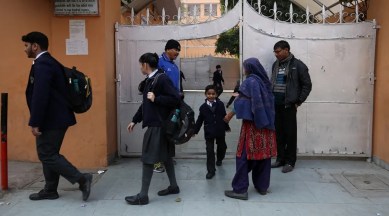New report card for Classes 9 to12 to cover post-school plans, entrance exams prep, college applications
These elements are part of a new ‘Holistic Progress Card (HPC)’, a report card that PARAKH — a standard-setting body under the NCERT (National Council of Educational Research and Training) — recently released for secondary school students (Classes 9 to 12).

From preparations for entrance exams to acquiring life skills such as time management and understanding the value of money — the report cards of students of classes 9 to 12 could be vastly different, reflecting a lot more than just marks scored in school-level and board examinations.
These elements are part of a new ‘Holistic Progress Card (HPC)’, a report card that PARAKH — a standard-setting body under the NCERT (National Council of Educational Research and Training) — recently released for secondary school students (Classes 9 to 12).
Sources said that while the report card will not be used in the ongoing 2024-25 academic session, teachers and other officials will be trained on its implementation. States can take a call on whether to implement the HPC as released by the NCERT or adapt it to suit their needs.
The HPCs are a part of the government’s effort to realign school report cards with the National Curriculum Framework for School Education (NCFSE), which seeks to transform evaluations by focusing on diverse skills and competencies, instead of just the performance in periodic pen-and-paper tests and exams.
Saying that the HPCs for classes 9 to 12 are designed to focus on the “learner as researcher”, Indrani Bhaduri, head and CEO, PARAKH, told The Indian Express that these report cards are expected to be factored in the results for those appearing for the Board exams in Classes 10 and 12.
“The HPC will be different from the internal marks that are part of Board exam evaluation. In the HPC, what the child has done during the academic years is reflected, and this is designed to augment the Board results. It will be amalgamated with the Board results,” Bhaduri said, adding that PARAKH has submitted to the Education Ministry the details of how elements from the HPC can be incorporated in the Board results.
The report card for the secondary level, which has been developed after deliberations with the SCERTs (the curriculum bodies at the state-level) and school boards, is also meant to contribute towards bringing equivalence across different boards
The Holistic Progress Cards are part of the government’s effort to transform evaluations by focusing on diverse skills and competencies, instead of just the performance in periodic pen-and-paper tests and exams. Similar HPCs were earlier designed for students from classes 1 to 8.
The progress card for classes 9 to 12 contains several sections, including one where students evaluate themselves on parameters such as ‘time management’, ‘plans after school’, and other life skills. The ‘plans after school’ section requires students to talk about their ‘next big step of my life’ — whether they plan to attend college, take up a vocation, or prepare for admission to a professional institute.
Additionally, students are asked to discuss with their parents, teachers and peers and complete a section detailing their strengths or abilities that could help them realise their post-school plans. They must also identify potential challenges and the improvements needed to achieve these plans.
The HPC also has an ‘accomplishments inventory’ to track the student’s “steps and skill” – whether they have gathered information on entrance exams, college applications, and job opportunities. This inventory includes academic skills like “engaging in independent work/research” and “thinking critically and creatively”, and life skills like “understanding the value of money and budgeting” and “managing stress for self and others.”
The teacher’s assessment of the student in group project work, the student’s own reflections on it, and peer feedback on the student’s understanding of and contributions to the project are part of the HPC.
Saying that while the HPC focuses on empowering learners to attain knowledge and skill independently, teachers will play a key role in guiding the students achieve their goals. “The teachers have to understand the required competencies vital for learners at the secondary level… This is to be done through activities like projects, individual research, and innovative classroom interactions. The activities need to be designed in a manner that they are meaningful to the students,” Bhaduri said.
Some states, including Jammu and Kashmir, Madhya Pradesh, Gujarat, Maharashtra, Haryana and Himachal Pradesh, have begun preparing to implement the HPCs for those up to class 8 from the 2024-25 academic session onwards.